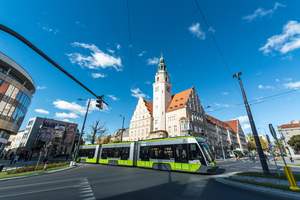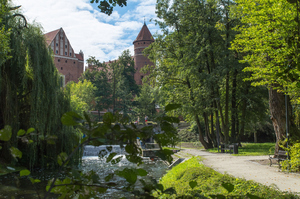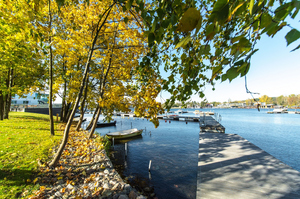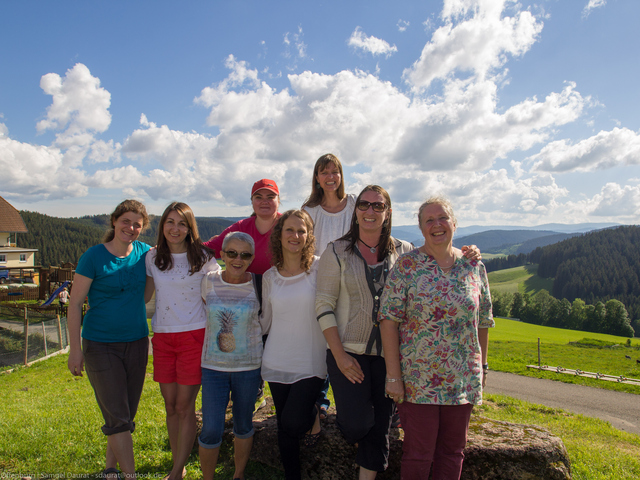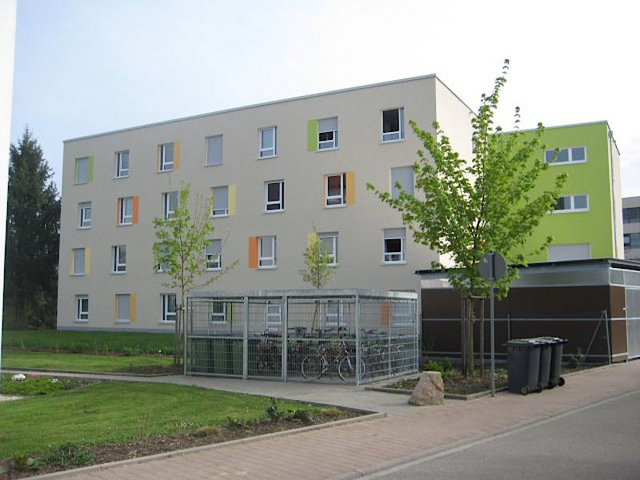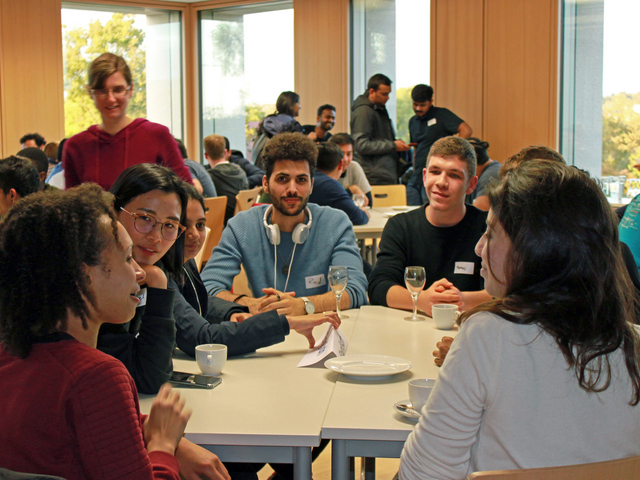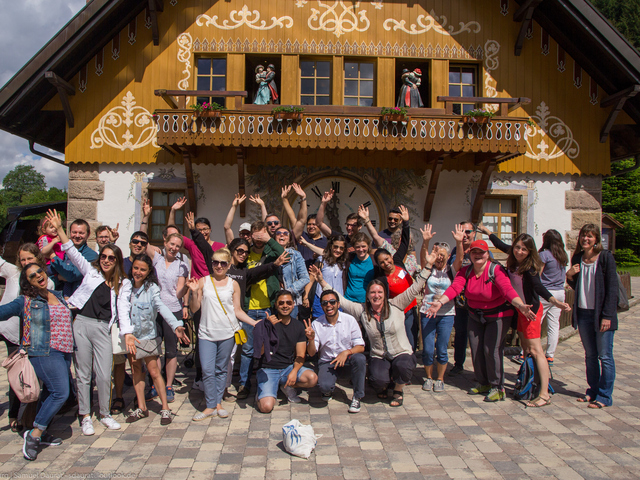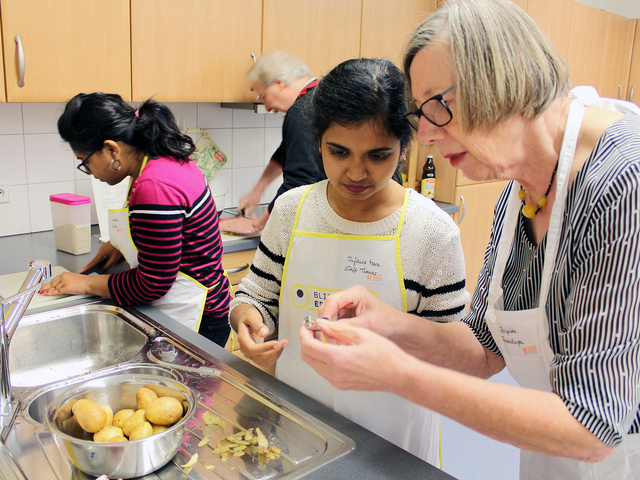Biotechnology
What's it about?
German-Polish Double-Degree Program
Join in on the transition from an oil-based to bio-based industry and sustainable energy supply or find, for example, an innovative solution to secure the food supply of the world's population!
The English-taught Master's degree program in Biotechnology (MBT) provides you the qualification to participate in the solution development for crucial issues of our future. The focus of the program is on bioeconomics, especially in the field of environment and nutrition. It is designed for three semesters of full-time study and awards the title of Master of Science.
The MBT program is organized jointly by Offenburg University of Applied Sciences and the University of Warmia and Mazury (UWM) in Olsztyn/Poland. It is the only internationally cooperative Master's program in biotechnology in the state of Baden-Württemberg and offers the opportunity to earn a double degree from the two partner universities.
The UWM is a traditional university with a strong focus on research. The University of Warmia and Mazury once again prides itself on being present in the world ranking of Times Higher Education (THE) Impact 2022. The university took 3rd place in Poland in the category of Good Health and Quality of Life. As many as 13 scientists from the University of Warmia and Mazury belong in their disciplines to the prestigious two percent of the best scientists in the world according to Stanford University. Two of those scientists teach students within the international program MBT.
Offenburg is a smaller-sized institution, and students benefit from more personal attention by instructors and staff, comprehensive support services, and close cooperation with the local industry and other business partnerships.
Biotechnology with a Focus on Bioeconomy
Biotechnology is regarded a key technology of the 21st century. It represents not only the necessary transition from an oil-based to biobased industry and sustainable energy supply, but also groundbreaking advances in medicine and food security for a growing global population.
The international, English-taught Master's degree program in Biotechnology (MBT) prepares graduates for this growing market with detailed expertise in the field of bioeconomics, particularly environment and nutrition.
Students work on case studies independently and familiarize themselves with the field of bioproduction, including important security measures and authority management. The resulting specialists will be fully aware of the future trends and opportunities of the highly innovative biotechnology industry, but also recognize potential conflict areas and ethical issues.
Additionally, the international orientation of the program provides students with valuable intercultural skills and other crucial qualifications in the distinctly multinational field of biotechnology.
Are you attracted by our international master's degree Program Process Engineering and meet all the requirements? Then you are invited to apply online through HISinOne.
There are 20 places per academic year.
Please have a look on the table below for the Application deadline for the winter semester.
Please use HISinOne to enter your personal data:
At the end of the first selection process (in April for winter term) you will be informed if your application was short-listed. In this case you will be invited to send your complete application documents by postal mail.
Thanks for your patience!
The establishment of a German-Polish double degree program at Offenburg University goes back to the so-called “Christmas Bridge”: In 1981, following a deep economic crisis after which many people in Poland lacked even the most necessary food items and supplies, the local parliamentary leaders in Offenburg's municipal council – Günter Fehringer, Engelbert Heck, Alfred Gailer and former Mayor Martin Grüber – suggested a relief action for Olsztyn, a formerly East Prussian city (“Allenstein”) with a population of approximately 180,000. Georg Dietrich, owner of a logistics company in Offenburg, immediately agreed to a relief transport aid. Through further aid shipments, the “Christmas Bridge” was established which ultimately, in 1998, led to the founding of the Georg and Maria Dietrich Foundation.
The Foundation subsequently became much more than an aid organization, promoting German-Polish exchanges on many levels. For example, during a choir trip to Olsztyn in the 1990s, the enthusiastic singer Professor Johannes Vinke from Offenburg University (HSO) initiated contacts with the local University of Warmia and Mazury (Uniwersytet Warmińsko-Mazurski,UWM) and went to teach there as a visiting professor for a time. In 2009, the double-degree program Master of Process Engineering was introduced at UWM and HSO. Ever since, the Georg und Maria Dietrich Foundation has actively supported both institutions and the students enrolled in the program. For example, Polish students receive scholarships to study at HSO; at HSO, start-up funding was provided in 2012 for the construction of the “E” building.
The contacts that Georg Dietrich helped establish continue to work together even after his death in 2013. A delegation from UWM traveled to Offenburg University for its 50th anniversary in 2014, for instance, and in the same year then-HSO Rector Professor Dr. Winfried Lieber received an honorary doctorate from UWM in Olsztyn. Numerous cultural exchanges, joint conferences and the expansion of the study program have followed, leading to the second German-Polish double degree program in 2018, the Master of Biotechnology. Finally, in 2022, the new HSO Rector, Professor Dr. Stephan Trahasch, personally met with UWM Rector Jerzy Andrzej Przyborowski twice – once in Olsztyn and once in Offenburg.
For students whose home university is Offenburg University of Applied Sciences, financial support for their stay in Poland under the Erasmus+ program is likely to be possible, provided that you meet the program's requirements and Offenburg University of Applied Sciences has sufficient funding available.
Details on the amount of funding for current projects can be found under Funding.
| Degree |
Master of Science (M.Sc.) |
| Language of instruction | English |
| Duration of program | 3 Semesters |
| Beginning of study program | Winter semester (October) |
| Registration Deadline |
March 31st (resident outside the EU) July 15th (resident within the EU) |
| Tuition and fees |
Fees per semester:
€ 1500 state tuition fee for non-EU citizens € 650 state tuition fee for a second degree (only for EU citizens who already obtained a master's degree from a German university) € 150 service contribution € 170 administration fees |
| Requirements | Above-average Bachelor’s degree in biotechnology or related area, such as bio-engineering, bioprocess engineering, biochemical engineering or food engineering, TOEFL iBT 79 or IELTS 6.0 (in each band), APS (only for applicants from China, India and Vietnam) |
| Internship | Professional experience preferred |
| Selection procedure | Yes |
| Accreditation | Yes |
| ECTS | 90 credits |
Important Links
Study and examination regulations
Regulations on the formal procedure of studies and examinations as well as on the admission requirements
Module manual
Description of the content of the fields of study of the degree programme
Competence Matrix
Good to know
Students at Offenburg University of Applied Sciences must pay a semester fee for each semester. The semester fee is made up as follows:
- State Administration Fee per semester, €80
This fee does not need to be paid by exchange students from partner universities or special scholarship program students
- Student Services Fee per semester, €65
This fee contributes to the student canteen, student residences, counseling services, student book store and other services offered by the "Studentenwerk"
- Student Representative Organization Fees per semester, €25.
This fee does not need to be paid by non degree seeking exchange students from partner universities or special scholarship program students
- Service Contribution per semester, €150 (only for students studying in one of the English master's degree programs of the Graduate School)
This fee is charged each semester for ongoing services of the Graduate School, such as liability insurance, assistance in finding accommodation, buddies, events and excursions.
- IBC-Program Tuition Fees: €10,400 (for students studying in the MBA-program International Business Consulting). Students of the MBA-program do not have to pay additional State Tuition Fees.
- State Tuition Fee for Non-EU-citizens: €1,500. You are exempted from this tuition fee if
- You are a citizen of the EU and/or the EEA
- Your spouse or one of your parent is a citizen of the EU and/or the EEA
- You have received your qualification of university entrance from the state of Germany
- You are officially recognized as a refugee in Germany
- You are an exchange student from one of Offenburg University's partner universities, or
- You were already enrolled at Offenburg University before the 2017/2018 winter semester
- State Tuition Fee for a Second Degree: €650 (only for students who are not exempted from the State Tuition Fee for Non-EU-citizens and already obtained a master's degree from a Germany university.
This information is supplied without liability. The jurisdiction on the exemption from tuition lies with the Federal State of Baden-Württemberg. For more information please click here.
Payment deadlines will be sent along with the admission letter. Exchange students from partner universities or special scholarship program students need to pay upon arrival.
In Germany, scholarships are usually not granted by the universities themselves but by independent institutions and foundations. The German Academic Exchange Service (DAAD) offers a comprehensive database of scholarships and grants, which must be applied for from your home country before your arrival. Information about funding possibilities are also provided by the European Funding Guide.
Detailed information is also available through the DAAD regional offices, the German Embassy, German Consulate or German Official Representations in your home country, as well as from the specific organizations granting the scholarships.
At Offenburg a very limited number of partial scholarships are also available; applications for these are only open to students enrolled who have shown high academic performance and social commitment outside of class.
In addition, there are a few scholarships for international students, through which they can be exempted from the 1500 EUR state tuition fees for one year. To be entitled to apply, students must be enrolled at Offenburg University for their second semester (or higher) of the respective degree program.
Depending on your preferred lifestyle, average living expenses amount to approximately € 992 per month. Here is a breakdown of monthly expenses:
Rent | 430 |
Health insurance (obligatory) | 132 |
Study materials | 41 |
Groceries | 275 |
Clothing, Public Transport, other | 114 |
Total monthly expenses | 992 |
For more information about the cost of rent, see the accommodation page.
Please note, in the first few days there will be several expenses such as your first rent, deposit, health insurance, etc. Therefore, we recommend bringing with you enough cash to cover these initial expenses.
Students who are EU-citizens are able to work in Germany without a work permit.
Non-EU students have two opportunities:
- Off-campus: 120 days per year, according to visa regulations for foreign students
- On-campus: a limited number of assistantships and tutoring jobs are available
A basic knowledge of German is required for most jobs.
Minimum wage leaflet: In cooperation between the Universities of Applied Sciences and industry and other employers against the background of the Minimum Wage Act - Information for Universities, published by haw-bw.de
- Next steps after admission
- Visa
- Financial Information
- Health Insurance
- Scholarships
- Buddy Program
- Transportation
Once you have been admitted to Hochschule Offenburg, you can use this section as an information source for pre-arrival preparations. Learn more about required documents, study fees and living expenses, accommodation and transportation, and more.
Another great source of information is the DAAD's brochure "Studying in Germany - A Practical Guide for International Students".
Students who come from a country that is not part of the European Union will need a visa to enter Germany and an additional residence permit to study in Germany. Students who are citizens of an EU country will have other entry and permit regulations. You can find out more information about visa requirements by contacting the German consulate in your country.
We recommend applying for your visa three months in advance, because some cases may take longer to process. Also be sure to apply for the correct visa, because you are not allowed to study with a tourist visa.
There is a comprehensive list of information on the German Federal Foreign Office's visa regulations page.
If you need to give a German address for your visa application, and don't know yours yet, you can give the information for Offenburg University of Applied Sciences (Badstrasse 24, 77654 Offenburg).
In order to receive a student visa, foreign students must be able to prove to German authorities that they have enough financial support during their studies. This means, you must prove that you are able to cover at least your first year of studies. Currently, that amounts to € 992 per month, or a total of € 11,904 for a year of study.
There are several forms of proof of financial support, which include a savings book, a confirmation from your bank on the credit balance available, a bank statement, proof of scholorship or a statement of support from your parents. Check with your local embassy to ensure you have the proper documents. In some cases you may be asked by your embassy to open a blocked account called a "Sperrkonto". This is available, for example, via Deutsche Bank, Fintiba or Expatrio. Please note that these are external service providers that are not affiliated with Offenburg University of Applied Sciences.
Please be aware, as it is only allowed to withdraw a certain amount of money per month from these blocked accounts, you will not be able to pay the tuition fees from the money on your blocked account.
Students will be responsible for their living expenses in Germany in addition to their tuition and fees. Before departure, it is a good idea to bring cash for your initial expenses, because a transfer from your home country could take 3-4 weeks. For more information about your first few days, please visit Upon Arrival.
An estimation of students' living expenses in Offenburg/Gengenbach, including a breakdown of the various costs, can bei found in the Costs and Expenses section.
Whoever wants to study in Germany is required to have health insurance. Without health insurance, a student is not allowed to enroll for studies. International students need health insurance upon arrival. Students are eligible for statutory health insurance at a low monthly rate of about € 130,00.
There are some countries within the EU that have agreements with Germany. If you are a student from one of these countries and you already have statutory health insurance from your home country, you may not be required to get additional German health insurance.
It is advisable to purchase traveler's insurance for your first few days in Germany. This way, you will be covered until you obtain your German health insurance.
Some companies, like Fintiba or X-patrio , also offer you to contract both types of insurances together online.
The organization that gives the largest amount of scholarships to international students in Germany, is the German Academic Exchange Service (DAAD). They have an entire www.daad.de/deutschland/stipendium/datenbank/en/21148-scholarship-database/, which you can use to find the best scholarships for you.
We will arrange for a "buddy" to help you settle in during your first weeks in Offenburg. Your buddy will be a student from Offenburg University of Applied Sciences, who will be in contact with you before your arrival in order to ask and answer important questions in advance.
Your buddy will be responsible for picking you up upon arrival, taking you to your accommodation and assisting you in communicating with your landlady/landlord and understanding the lease. Additionally, your buddy will help you with registering at the town hall and the foreign residents office, opening a bank account and showing you where to go grocery shopping. Your buddy will also show you around the campus.
Offenburg University of Applied Sciences has two campuses, both of which are easily accessible by plane, train or car.
- Campus Offenburg
Badstr. 24
77652 Offenburg
Germany - Campus Gengenbach
Klosterstr. 14
77723 Gengenbach
Germany
- location map
Airports
Frankfurt airport is the largest international airport in Germany, with two railway stations: one for within the city, and one for long distances, the "Fernbahnhof". There is a "Fernbahnhof" train directly to Offenburg from Frankfurt airport, and from Offenburg you can take a local train to Gengenbach.
Other nearby airports include: Karlsruhe/Baden-Baden, Basel-Mulhouse (CH/F), Strasbourg (F), Stuttgart and Zurich (CH).
Trains
Offenburg is a railway junction with regular connections to many major German cities, thus making it very accessible. From Offenburg, Gengenbach can be reached within 7 minutes by means of local train.
For information on train schedules and prices, please visit the German railway website.
By Car
Offenburg and Gengenbach are both conveniently located along motorway A5. A map of the Offenburg campus can be seen here, and a map of the Gengenbach campus can be seen here.
- Enrollment
- Opening a Bank Account
- Health and Liability Insurance
- Registration in Germany
- eAT (Electronic Residence Permit)
- GEZ-Fee
- Orientation Events
Once you arrive in Offenburg or Gengenbach, you need to enroll at the University. Exchange students do so at the International Office, Master's degree students at the Graduate School's registrar's office.
Before enrollment, exchange students have to pay their fees at the the University's payment office (room A106 on the Offenburg Campus). Please note that this office accepts cash payments only.
Graduate School students have to have transfered the fees in advance by a given deadline in order for their admission to be valid.
For detailed information about the relevant fees, please see the website on "Costs and Expenses."
Once enrolled, you will receive your registration certificate and student ID, which is called OSKAR (link in German only). The OSKAR card offers a number of additional advantages, such as paying for meals at the campus cafeteria or for the printing services on campus. You will also receive an email account from Offenburg University.
One of the first things you should do after arrival is opening a bank account, because health insurance, rent and other obligations can only be paid by bank transfer.
To open a bank account, bring your passport and the registration certificate you receive at enrollment, so that you qualify for a free student account. Bringing cash will allow the account to be opened immediately, whereas a transfer from your home country could take up to three or four weeks.
There are three main ways of conducting monetary transactions:
- Transfer - used to move money from one account to the other; transfer forms can be filled out by hand at the bank or online
- Standing order - used for recurring payments of a specific amount, e.g. the monthly rent; the bank automatically debits your account on an agreed date
- Direct debit - used for recurring payments of varying amounts, e.g. phone bills; the recipient is given a direct debit authorization to deduct the respective amount from your account.
In Germany most transactions are conducted with cash, especially when paying a small sum of money. Credit cards are relatively common, but not often used for everyday purchases. Instead, people pay more often with debit cards. When you set up a German bank account, you will receive a debit card that you can use at the ATM of your bank free of charge or while you are shopping.
Health Insurance
To study in Germany, you are required to have health insurance coverage. Therefore, before enrolling at Offenburg University you need to provide proof of valid health insurance, i.e. a confirmation that you are covered by a German statutory-health-insurance provider. For more information about the German healthcare system, offered in 10 different languages, please check here.
In general, statutory health insurance companies offer cheaper rates for students, at approximately € 90 per month.
International students from EU countries who have statutory health insurance in their home country can have their insurance coverage recognized in Germany. These students must bring their European Health Insurance Card (EHIC).
Here you can download information about student health insurance.
Liability Insurance
Liability insurance is taken out if you cause damage to someone else or their property. In Germany, you are legally responsible not only for material damages, but also, for example, health damages. Therefore, liability insurance is one of the most important insurances if you travel or live in Germany!
By paying the semester fees, all enrolled students of Hochschule Offenburg are covered by liability insurance. However, this only applies to activities that have a causal connection with your studies and take place on the premises of the University, or are part of a course stated in the study curriculum. Cover is also provided during approved work-experience programs which are part of the study curriculum.
Damages declaration forms and further details on student liability insurance can be found on the website of the Studentenwerk Freiburg.
For students of the Graduate School we take out our own liability insurance, financed by the Service Contribution fee, which also covers damages that are not causally related to the University. Exchange students and others, who are studying in one of the other study programs and/or are not obliged to pay the Service Contribution, are strongly recommended to take out liability insurance on their own, at the cost of € 24 per year.
Germany has a personal registration law which requires everyone to register with their local government office. International students must report to their local foreign-nationals office within one week of arrival and register themselves. At the same office, students requiring a residence permit will have their visas converted into a residence permit for the duration of their studies. EU citizens don't need a residence permit, but are also obliged to register at the registration office and obtain a freedom-of-movement permit (Freizügigkeitsbescheinigung).
Please bring the following documents for registration:
- Your passport
- A passport-sized photograph
- The registration certificate from Offenburg University
- Proof of financial support
- Your signed rental contract
- Proof of existing health insurance
For students living in Offenburg, you must register with the Office for Non-German Citizens (AusländerBüro), which has a website in German only. For students living in other communities of the Ortenau district, including Gengenbach, you must register at the Immigration Office of the Landratsamt (district office).
The opening hours are as follows:
AusländerBüro: Monday-Friday 8:00-12:00 noon, Thursday 1:00-6:00 pm
Landratsamt Immigration Office: Monday-Wednesday and Friday 8:00-12:00 noon, Thursday 1:00-6:00 pm
In the past, a residence permit (German "Aufenthaltstitel") was issued in the form of an adhesive label placed in the ID card or passport. Since 2011, electronic residence permits (eAT) for non-EU nationals have been issued as a separate document in credit-card format.
The permit is equipped with a contact-free chip inside the card on which biometric features (photograph and two fingerprints), ancillary conditions and personal data are saved. Additional provisions relating to the residence permit are no longer printed on a label and stuck into the passport, but saved on the eAT chip and printed on a supplementary sheet that is issued along with the eAT.
Please note that the eAT is only valid for as long as the registered accompanying passport is. Therefore, please make sure that your passport is sufficiently valid or apply for a passport extension in good time. Also, travel to other Schengen-area countries is permitted only after issuance of the eAT.
eAT costs:
- Duration up to one year: € 100
- Duration of more than one year: € 110
- Extension for more than three months: € 80
How and where to get the eAT:
- Pick up the application form from the Ausländerbüro
- Fill out, sign, and return the application form to the Ausländerbüro where you will receive a checklist
- Take the checklist and other required documentation to the Bürgerbüro
- You will receive an email invitation/appointment for fingerprint scanning
- You will receive an email notification when your eAT is ready to be picked-up
Additional information:
The Federal Office for Migration and Refugees has published the booklet “All you need to know about the electronic residence permit (eAT),” which is also available in other languages.
Please be informed that as a resident of Germany you are legally required to pay a monthly fee of €18.36 per household (e. g., per shared apartment) to the Gebühreneinzugszentrale der öffentlich-rechtlichen Rundfunkanstalten (GEZ), a joint organization of Germany's public broadcasting institutions.
‘Per household’ in this context means that if you share an apartment, only one of the tenants has to pay, and it is up to the household members to decide how they divide up the costs. Thus, if you move into a shared place, you should first clarify whether one of the other household members is already paying the GEZ fee.
However, your German roommate(s) might be exempt from the fee because they are recipients of federal financial aid. To be sure, such an exemption does not extend to the remaining household members, who still have to pay the full fee.
If you live by yourself, or if no one in your household has been paying the GEZ fees yet, you are required to register with the GEZ – regardless of whether you are actually using or even able to receive the broadcasts. Note that failure to do so, whether purposefully or by negligence, constitutes a misdemeanor and may lead to fines.
The responsibility of paying the GEZ fees begins with moving in and ends when you move out again and have deregistered your place of residence at the local international office (Bürgerbüro). Hence, when you move out, remember to deregister from the GEZ as well!
For more details, refer to this information sheet by Deutsches Studentenwerk (in English).
At the beginning of the semester, several orientation events are held for international and exchange students, where they get to know the campus, professors and lecturers and fellow students, and have plenty of opportunities to clarify any remaining questions about their studies at Hochschule Offenburg.
For all new students, an Introduction Day is held the day before the beginning of classes, including a welcome address by the Rector. New Master's degree students also meet for several orientation days at a special retreat, often in the Black Forest or at Lake Constance.
You will be notified about all relevant orientation dates and locations before your arrival.

